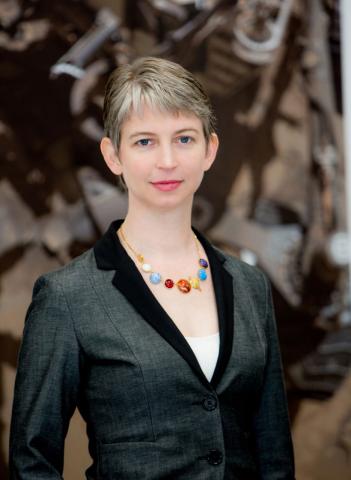Emily Lakdawalla '96

Name: Emily Stewart Lakdawalla
Place of Birth: Delaware, but first place I remember living is Williamstown, MA
Current Home: Los Angeles, CA
Education: M.Sc. in planetary geology, Brown University, 2000
Why did you choose to come to Amherst?
Having grown up in Texas, I wanted to return to New England. I also wanted a small school with no grad students so the professors would be focused on the undergrads. I looked at 8 schools and picked Amherst because I liked how our tour guide didn't say any one department was particularly good, they were all good—and I fell in love with the view from Memorial Hill instantly.
Most memorable or most influential class at Amherst
Probably Geo 11 since it influenced the rest of my professional life!
Awards and Prizes
(Taken from the biography on The Planetary Society website): She was awarded the 2011 Jonathan Eberhart Planetary Sciences Journalism Award from the Division for Planetary Sciences of the American Astronomical Society for her blog entry about the Phoebe ring of Saturn. Asteroid 274860 was formally named "Emilylakdawalla" by the International Astronomical Union on July 12, 2014. She received an honorary doctorate from The Open University in 2017 in recognition of her contributions in communicating space science to the public.
Favorite Book
I hate "favorite" questions. That said, the one I recommend most often, because not so many people have read it and I love it, is The Pride of Chanur by C. J. Cherryh (it's a hard science fiction novel featuring a sort of lion-people alien race experiencing first contact with a lost alien who the reader recognizes as human but can only see through the lion-people's eyes). I've been reading a lot of middle-grade and young-adult books recently because that's how old my daughters are, and hands down the best one I've read lately is The War That Saved My Life by Kim Brubaker Bradley. It's one story to a kid and a whole 'nother level of story to a grownup reading it. But a close second is Binti, by Nnedi Okorafor, featuring a space-traveling girl of the Himba people who winds up being the key to peace among warring alien civilizations.
Favorite author
Ugh I have so many. One of the best things about being on Twitter is being able to engage as a peer with authors I idolized at various ages in my youth—everyone from Elizabeth Moon (who wrote some of my very favorite fantasy novels) to Sandy Boynton (author of such rhythmic board books as Moo, Baa, La La La and The Going to Bed Book). I just love Nnedi Okorafor, mentioned above. Her books are great and she's a wonderful personality, so confident in her art and confidently raising a teenage daughter between the U.S. and Nigeria despite everything both countries have to throw at her.
Tips for aspiring writers?
Write. Even when it's painful and you know your words are bad. Put something down, no matter how bad. Sometimes I get stuck and I'll write "Words about X go here" and then move past the stuck point and eventually I can come back to the hard part. For nonfiction writing, it's really helpful to make each paragraph be a mini-essay that can stand on its own. That way if the narrative structure isn't working, you can rearrange the paragraphs until you get a working storyline. Also, it helps readers who need to read fast and can just skim by reading the topic sentences of each paragraph until they get to a part they really want to read, and they slow down. It takes practice to do this and still write fun interesting prose, but it also really helps to knock a big project down into manageable pieces.
Tell us a bit about your path to becoming an author
Well, I was always a writer. In high school I participated in a science fiction writing club, mostly with other adults (one other friend from my class joined). At Amherst, of course, there was a lot of writing. There was a hiatus while I was a schoolteacher, but I was developing curriculum instead. In grad school, my advisor had me writing practically from the first month, preparing abstracts for scientific meetings. My first abstracts were very bad but you have to get those out of the way in order to get better. In grad school I started writing websites explaining how to do image processing—a precursor to what I'm still doing today. My first job out of grad school was working for an environmental consulting company, writing. It was commercial, technical writing, but it was still writing and (just as important) editing the writing of fellow contributors to make sense. Moving to The Planetary Society I started writing web pages, explainers on planets and planetary science, and soon I was writing news articles as a space journalist, and a little while after that I was editing the whole website, and then people started paying me to write articles freelance, and finally a publisher approached me to write this book. I'd been thinking about writing a book but didn't have the time or energy to come up with a proposal and shop it around. This one fell in my lap—but it's an academic publisher and it won't ever sell more than a few thousand copies so I'll hardly make more money having written this academic book than I would have writing one or two more magazine articles. Fortunately, my employer was willing to cover my time. I'm really glad I did it, because it's helped reinforce my status as someone separate from space journalists—I'm more of a member of the scientific community than I am a member of the journalist community, and this book reflects that. At the same time, the book has the goal of making the complicated machine comprehensible to everyone who's interested, so it appeals to a certain segment of the public. It's the niche I'm comfortable with.